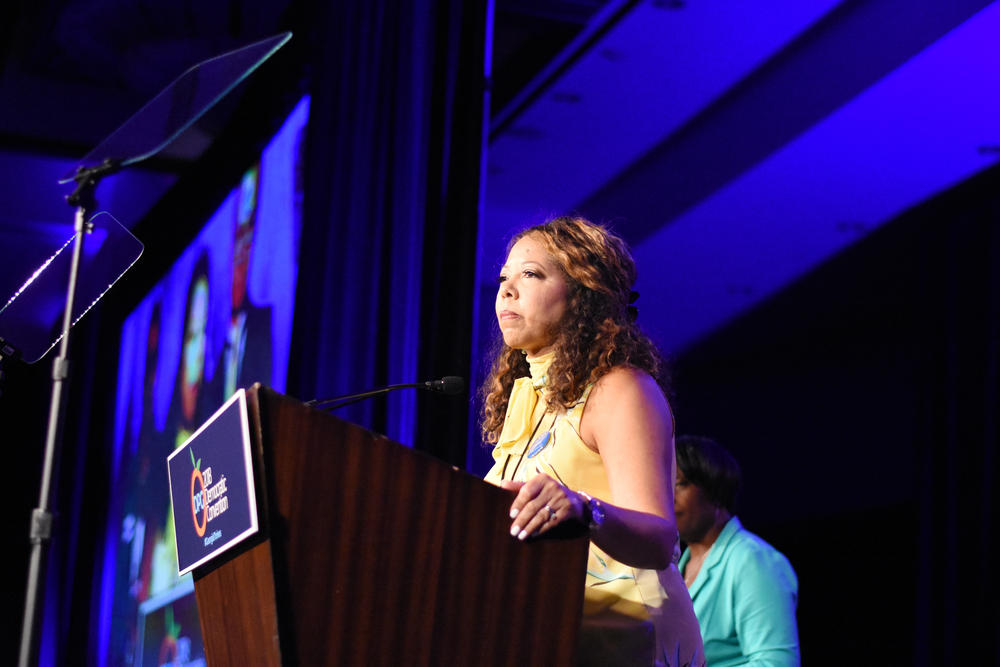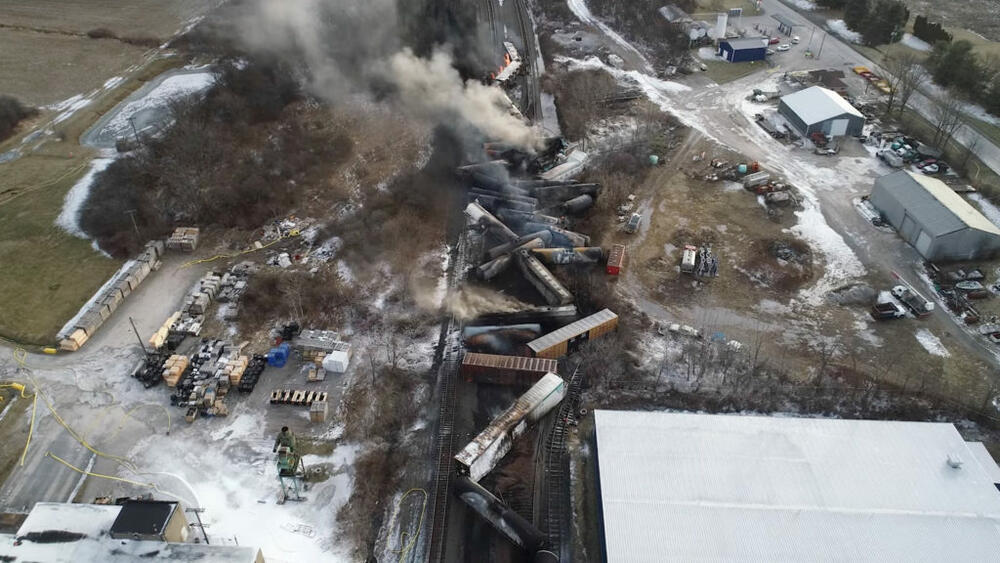
Section Branding
Header Content
Georgia Today: Democratic Party chair steps down; Election lawsuit dismissed; Maternal mortality
Primary Content
On the March 31 edition: U.S. Rep. Nikema Williams steps down as the chair of the state's Democratic Party; the U.S. attorney general orders dismissal of a lawsuit challenging election law in Georgia.

Orlando Montoya: Hello and welcome to Georgia Today. On this podcast, we bring you the latest reports from the GPB newsroom. On today's episode, Georgia U.S. Rep. Nikema Williams steps down as the chair of the state's Democratic Party. The U.S. Attorney General orders the dismissal of a lawsuit challenging a controversial new election law in Georgia. And why does Georgia have one of the highest maternal mortality rates in the nation?
Amy Yurkanen: The goal of these committees is to improve maternal health care. It's not to push for any certain policy or ideological thing.
Orlando Montoya: Today is Monday, March 31. I'm Orlando Montoya.
Story 1:
Orlando Montoya: Georgia U.S. Rep. Nikema Williams has stepped down as chair of the state's Democratic Party. The move came after the party's state committee voted to make the chair role a full-time position, making Williams unable to serve. In a statement released today, Williams highlighted accomplishments during her time as chair, which began in 2019. She said during her tenure the state party became, quote, "not just present, but powerful." Some Democrats disagreed with that assessment after the 2024 presidential election returned Georgia to the Republican column. She then faced mounting pressure for her to resign, including from party insiders, major donors, and U.S. Sen. John Ossoff. She was the first Black woman to chair the Democratic Party of Georgia. Matthew Wilson, the party's first vice chair, will serve as interim chair until the state committee elects a permanent replacement.

Story 2:
Orlando Montoya: Georgia U.S. Rep. Lucy McBath says she's suspending her exploratory 2026 bid for governor, casting uncertainty on the Democratic field. McBeth said today that she still might run for governor, but she says she needs to focus on her husband's health after complications from cancer surgery. The four-term member of Congress, representing a metro Atlanta district, filed March 5 to raise money for a gubernatorial campaign. McBath says she's remaining in Congress. Term limits prohibit Republican Gov. Brian Kemp from running again, so both the Republican and Democratic fields are open. On the GOP side, Attorney General Chris Carr is running and Lt. Gov. Burt Jones is widely expected to run. Names floated on the Democratic side, apart from McBath, include former Atlanta Mayor Keisha Lance Bottoms, state Sen. Jason Estevez. and former DeKalb County CEO Michael Thurmond.
Story 3:
Orlando Montoya: Georgia has one of the highest rates of maternal mortality in the nation. So how do we get these numbers? In Georgia, it's the Maternal Mortality Review Committee that's largely in charge of tracking and analyzing deaths that happen during and up to a year after pregnancy. ProPublica recently dug into the dismissal of the committee's members in a high-profile abortion case. GPB's Sofi Gratas spoke with ProPublica's reporter on that story, Amy Yurkanen, who's based in Alabama.
Sofi Gratas: Thanks for talking with me today.
Amy Yurkanen: Thank you for having me, Sofi.
Sofi Gratas: Let's set the scene. What have you learned in your reporting about the main responsibilities of this committee, including how they handle the information that they're given?
Amy Yurkanen: So maternal mortality review committees exist in every state in the United States and there are a handful of cities that also have their own committees. They usually look at medical records. That's like a bedrock part of this. Sometimes they're also interviewing family members or other people involved in the care. So these are really pretty comprehensive investigations. What the public gets are sort of these comprehensive reports which contain really no narrative information about any particular case.
Sofi Gratas: So last fall, one of your colleagues at ProPublica, Kavitha Serana, she reported on the deaths of two Black women in Georgia. That was Candi Miller and Amber Thurman. Both of them died from mismanaged abortions and their deaths were being investigated by this maternal mortality review committee. Tell me what happened after that reporting came out.
Amy Yurkanen: So those stories came out in mid September. In early November, the head of the Department of Public Health, Dr. Toomey, sent letters to all the members of the Maternal Mortality Review Committee and basically dismissed everyone on the committee. The reason that they were being dismissed was because there had been basically a release of information that's not normally public. I was very interested in following up on that and finding out, you know, who they were going to put on the new committee, and in February I was told that that information is not going to be released to the public anymore.
Sofi Gratas: I also got a list of the members that formerly were on that committee. And so, you know, just to give folks an idea, there were a couple perinatal psychiatrists, some OBs, a medical examiner, some doctors in maternal and fetal medicine. There were also some community health workers, folks maybe more in the advocacy realm. Why is it a big deal that now we might not know the names or the identities of committee members?
Amy Yurkanen: I think that this is going to raise a lot of issues about how much we can really trust reports coming out of this committee. Right now they're reviewing cases that are happening after the fall of Roe v. Wade. So, you know, there's questions about how they're going to evaluate access to abortion and sort of how that may contribute to some of these deaths. And since we really don't know who's on this board, we don't how they're going to be tackling those questions.
Sofi Gratas: I wanted to play a clip from Amber Thurman's mom, Shanette Williams, when she spoke outside of the state Capitol recently.
Shanette Williams: And for the person that said, "I'm going to let the journalists know" that my daughter's death was preventable. I will never know your name, but I say thank you.
Sofi Gratas: To me, it's just evident that especially people affected by this crisis of maternal mortality, they want to know what the state's doing to address it.
Amy Yurkanen: It's a very tricky sort of line to walk, but certainly, you know, where families have questions, you can understand them wanting more information. You know, the goal of these committees is to improve maternal health care. It's not to push for any certain policy or, you know, ideological thing.
Sofi Gratas: You can read the rest of Amy Yurkanen's and her colleagues reporting at ProPublica.org and at GPB.org. Amy, thank you for joining me today.
Amy Yurkanen: Thank you.
Story 4:
Orlando Montoya: U.S. Attorney General Pam Bondi has instructed the Justice Department to dismiss a lawsuit challenging a sweeping 2021 election law in Georgia. Republican state lawmakers passed the overhaul in the wake of President Donald Trump's 2020 election loss in the state. The lawsuit was filed in 2021 under the administration of former President Joe Biden. It alleged that the Georgia law was aimed at denying Black voters equal access to ballot. The law resulted in fewer ballot drop boxes available in populous metro Atlanta counties that lean Democratic. Bondi said today that the Biden administration had pushed, quote, "false claims" of suppression.
Story 5:
Orlando Montoya: State laws mandating paid family leave can keep children safe. That's according to a new study from the Georgia Institute of Technology. GPB's Ellen Eldridge has more.
Ellen Eldridge: Researchers analyzed national child abuse data and found that home removals due to unsafe conditions dropped 46% in states with paid family leave policies. Georgia Tech School of Public Policy researcher Lindsay Rose Bollinger led the study. She says families in states requiring it have an easier time navigating the stresses of being new parents.
Lindsay Rose Bollinger: One of the ways that we can lower the rate of abuse and neglect among infants is to have more time for parents to bond with their children and learn their baby.
Ellen Eldridge: She says paid family leave is not required in Georgia. Meanwhile, in 2021, Georgia did approve family leave for state employees and educators. For GPB News, I'm Ellen Eldridge.
Story 6:
Orlando Montoya: Three of the four soldiers from Southeast Georgia's Fort Stewart who went missing in Europe last week were found dead this morning in Lithuania. The search continues for the fourth soldier. GPB's Benjamin Payne reports.
Benjamin Payne: The U.S. Army says the soldiers' bodies had been recovered from an armored vehicle after it fell into a swamp during a training exercise in eastern Lithuania. Their names have not been released, pending notification of next of kin. This comes nearly a week after they were reported missing while executing a training mission near the NATO member's border with Belarus, an ally of Russia. The four soldiers have been deployed from the U. S. Army's Fort Stewart in Southeast Georgia's Liberty County, about 30 miles southwest of Savannah. This is not the first training exercise involving soldiers stationed there to go awry this year. In February, two soldiers died near Fort Stewart after their tactical vehicle rolled off the road into standing water. For GPB News, I'm Benjamin Payne in Savannah.

Story 7:
Orlando Montoya: Norfolk Southern wants two other companies to help pay for the $600 million class-action settlement it agreed to over its disastrous 2023 train derailment in eastern Ohio. The Atlanta-based railroad was set to go to trial today to force another transportation company and a chemical manufacturer to share the settlement costs. Norfolk Southern believes the companies are partly responsible for the derailment and toxic chemicals that were released and burned.
Story 8:
Orlando Montoya: The city of Atlanta is launching a program to support and recognize legacy businesses. Those are businesses that have been in operation for 30 years or longer. The Atlanta Local Legacy Program includes grant opportunities for business modernization and construction. It comes on the heels of some closures of longtime businesses, including Breakfast Spot, Java Jive, and LT Wings, as well as mounting commercial pressures on businesses from new development. The city estimates there are more than 400 legacy businesses in Atlanta.
Story 9:
Orlando Montoya: It's been six months since a massive chemical fire at the BioLab facility in Conyers, east of Atlanta, sent a toxic plume of smoke over the area, forcing thousands of people to evacuate or shelter in place. Now a new investigative podcast from Georgia Public Broadcasting revisits that day and the deeper questions it raised. The podcast is called Manufacturing Danger: The BioLab Story. Pamela Kirkland is the host of GPB's Morning Edition and she hosts the series. Thanks for coming.
Pamela Kirkland: Thank you for having me.
Orlando Montoya: So let's start from the beginning: For those who don't know, what happened at BioLab last year?
Pamela Kirkland: Yeah, so as you said, it was about six months ago. It was early in the morning on Sept. 29. A fire broke out at the BioLab chemical plant. And BioLab is a company that makes cleaning products for pools and spas. So the fire, according to investigators, was caused by a chemical reaction of these chlorine-based products that they store. They somehow got wet. That created a chemical reaction and produced this plume of smoke that people were able to see from miles away. Emergency alerts went out. I-20, which if you've ever taken 20 to get into or out of Atlanta, you know that is a pain when it is shut down, and that was shut down for hours. 17,000 people were told to evacuate, 90,000 others were told shelter in place, and it affected businesses and Rockdale County public schools for weeks. And the county was issuing these shelter-in-place orders mostly at night, but up until Oct. 17, so well after the fire had happened.
Orlando Montoya: And it really scared people.
Pamela Kirkland: It did. People were really scared because there were a lot of questions around what kind of chemicals were in this plume. What were the effects of chemical exposure? Was the air okay to breathe? Was it in the water? Just this immediate anxiety and questions over, environmentally, what are some of the impacts here, and also health-wise for a lot of the residents that lived there.
Orlando Montoya: I know you've spent a lot of time following this. It's been six months. Where did this story take you and where will the podcast take listeners?
Pamela Kirkland: Yeah, so we're going on a trip. It took me to Rockdale County. I've spent a lot of time in Conyers, but it took me into BioLab's past because this wasn't the first fire there. There were other incidents dating back years that we've found. We looked into local and state and federal responses to the most recent fire and those past fires, and also some of the regulatory agencies that are at play here. And it actually took me out of Georgia up to Nashville to a pool and spa trade show to look at the business of the pool chemical industry itself, and it is a multi-billion dollar business. And I learned a lot about different chemicals: how they can work, how they can interact, and how, in this case, a little bit of water can cause a very violent reaction.
Orlando Montoya: And it's always the ordinary people, the folks in the community who live through a situation like this, that are some of the most powerful stories. Who or what stood out to you the most from your visits?
Pamela Kirkland: Yeah, so you'll hear from a lot of those residents throughout the podcast, but I think the most common thing that I've heard from residents is that they're looking for some kind of accountability. They think that accountability looks different, depending on who you're talking to, but just looking for someone to take responsibility for what happened and to say that "These are the things we're going to do so that it never happens again."
Orlando Montoya: So the first episode in the podcast dropped today, and that's about what happened on that day. What can we expect in episodes to come?
Pamela Kirkland: So we're going to peel back layers as we go through this. So each episode, we'll pull back another layer. We'll look at BioLab's history and the fires and chemical incidents going back decades. We're gonna dig into what was released into the air and what that means for public health. We're going look at the pool and chemical industry and how that operates and what kind of oversight it faces and what happens when those things go wrong. And of course, we're gonna talk to residents who are still trying to make sense of what happened and how to move forward.
Orlando Montoya: Okay, GPB's newest podcast, called Manufacturing Danger: The BioLab Story, hosted by GPB's Pamela Kirkland. Thank you so much for reporting about the story and for joining me today.
Pamela Kirkland: Thank you for having me.

Story 10:
Orlando Montoya: Over the weekend, the Savannah Bananas brought their touring baseball show to the home of the Atlanta Braves for the very first time. GPB's Chase McGee has more.
Chase McGee: On Saturday and Sunday, the Banana Ball World Tour stopped in Cobb County's Truist Park as the Savannah Bananas faced off against their in-house rivals, the Party Animals, in front of two sold-out crowds. For a few Banana Ballers, Truist is more than another stop on the tour: It's the home of the team they've cheered on their entire lives. Bananas pitcher Austin Krzeminski calls the experience a blessing.
Austin Krzeminski: It's an absolute dream come true, growing up a Braves man my entire life, so being able to come here and pitch in a sold-out crowd with all my friends and family in the attendance, it's really, truly wonderful.
Chase McGee: The Banana Ball World Tour will be on the road for another six months, but tickets are currently sold out through June. For GPB News, I'm Chase McGee in Atlanta.
Story 11:
Orlando Montoya: The attempt in Macon last Friday to break the world record as certified by Guinness for the most people playing the kazoo together —that would be five minutes — came up short. Just under 2,000 people came to the Atrium Health Amphitheater to try and best the record set in London in 2011 of 5,190 kazooists. But even though they didn't have the numbers, people still buzzed through a medley of Macon music hits like this one: Otis Redding's "Sittin' On The Dock Of The Bay."
MUSIC
Orlando Montoya: The event was a fundraiser for the Otis Redding Foundation's Youth Music Education Programs.
Orlando Montoya: And that's it for this edition of Georgia Today. I hope you had a great Monday. It was a crazy day weather-wise here in Georgia with some severe weather warnings going out today. We even had the world's busiest airport, Hartsfield-Jackson Atlanta International Airport, shut down for a little while. All flights stopped because of severe weather. That line of storms was expected to be out of the state by tonight, but whenever you are listening to this story, we hope that you had a great Monday. I'd like to remind you as well that if you hear stories on this podcast that you'd like to learn more about, visit our web page, GPB.org/news. Hit subscribe on this podcast so you never miss an episode. If you have feedback, send it to GeorgiaToday@GPB.org. I'm Orlando Montoya. We'll be back again tomorrow.
---
For more on these stories and more, go to GPB.org/news



